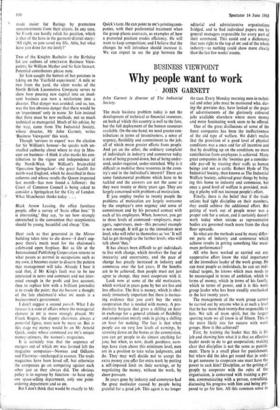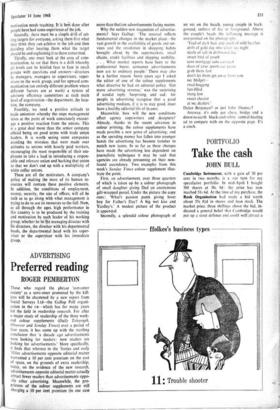Why people want to work
BUSINESS VIEWPOINT JOHN GARNETT
John Garnett is director of The Industrial Society.
The main business problem today is not the development of technical or financial resources, on both of which this country is well to the fore, but the full deployment of the human resources available. On the one hand, we need greater con- tributions in terms of inventiveness, a sense of urgency, flexibility and commitment to the job; all of which mean greater efforts from people. And yet on the other, the ordinary complaint of individuals in industry and commerce today is not of being ground down, but of being under- used, under-required, under-stretched. Why is it difficult to mobilise these resources in the coun- try's and in the individual's interest? There are some fundamental problems which have to be tackled and the answers are not the same as they were twenty or thirty years ago. They are largely concerned with problems of motivation.
If you employ twelve to twenty people the problems of motivation are largely overcome by the employer's own urgency and sense of commitment and by his personal contact with each of his employees. When, however, you get to three levels of command—employers, man- agers, supervisors, men—this personal example is not enough. It will go to the immediate next level, who will refer to themselves as 'we.' It will fail to get through to the further levels, who will talk about 'they.'
It has always been difficult to get individuals to live with change, which involves the fear of insecurity and uncertainty, and the pace of change has greatly increased in industry and commerce over the last years. If the benefits are to be achieved, then people must not just agree to change, they must cooperate with it.
Look now at some of the old motivators, which worked in years gone by but are less and less effective. The first is money, which is obvi- ously immensely important but there is increas- ing evidence that you can't buy the extra cooperation that is needed with money. A pro- ductivity bargain that gives a shilling an hour in exchange for a general attitude of flexibility and cooperation merely ends in giving a shilling an hour for nothing. The fact is that when people are on very low levels of earnings, by screwing down on the bonus or the commission, you can get people to do almost anything for you; but when, as now, thank goodness, earn- ings have risen above this minimum level, men are in a position to take value judgments, and do. They may well decide not to accept the extra money you offer for extra work by putting a self-imposed limit on their earnings, or by negotiating the money, without the work, by sheer pressure.
In years gone by industry and commerce had the great motivator caused by people being grateful for a good job. This again is no longer the case. Every Monday morning men in techni- cal and other jobs must be motivated who, dur- ing the previous day, have looked at the pages of advertisements of the gloriously coloured jobs available elsewhere where more money and more fascinating work seem to be offered.
One of the great disillusions of some of the finest companies has been the ineffectiveness of the old type of welfare. We didn't realise that the provision of a good level of physical condition's was a once and for all incentive and that by doubling up on the conditions no more contribution from employees is achieved. Many great companies in the 'twenties got a consider- able pay-off by treating their staffs as human beings and not as cattle. Robert Hyde of The Industrial Society, then known as The Industrial Welfare Society, achieved great things by bring- ing this home to industry and commerce, but once a good level of welfare is provided, mak- ing it plushy will not increase people's effort.
Finally, there is the belief that if the trade unions had tight discipline on their members, they could achieve the additional effort. But getting of work out of people never was a proper role for a union, and it certainly doesn't work today when unions as representative bodies are governed much more from the shop floor upwards.
So what are the methods used by many differ- ent parts of industry and commerce which achieve results in getting something like maxi- mum performance?
All who have worked or carried out any cooperative effort know the vital importance of the immediate leader of the work group. He can treat people as individuals, he can set indi- vidual targets, he knows which man needs to be encouraged in terms of ambition, which in terms of money, which in terms of his family, which in terms of power, and it is this work group leader who has been steadily overlooked in the last twenty years.
The management of the work group cannot be carried out by anyone who is at such a level that he has more than twenty-five responsible to him. We talk of team spirit, but the largest sporting team we all know is of fifteen. This is the more likely size for success with work groups. How is this achieved?
First, by training the leader that this is his job and showing him what it is that an effective leader needs to do to get cooperation; making clear that discipline is not the same as punish- ment. There is a small place for punishment, but where did the idea get round that in order to get someone to cooperate one must have the power to sack him? Discipline, or the getting of People to cooperate with the rules of the organisation, is concerned with training a per- Vat, communicating with a person, consulting, discussing his progress with him and being pre- pared to go for him. All this common sense in motivation needs -teaching. It is bes.t done after people have had some experience of the job.
Secondly, there must be a simple drill of set- ting targets for everyone, asking them first what they think they can achieve in the job and then deciding after hearing them what the target should be and explaining it to those concerned.
Thirdly, one must look at the area of com- munication, to see that there is a drill whereby all levels can be briefed face to face in small. groups with questions and answers—directors to managers, managers to. supervisors, super- visors to the work group; and for upward com- munication (an entirely different problem where different factors are at work) a system of advisory efficiency committees at each main level of organisation—the department, the loca- tion, the company.
Fourthly, we need a positive attitude to trade unionism whereby the steps management takes at the point of work consciously encour- age a positive reaction from the unions. This is a great deal more than the senior company official being on good terms with trade union leaders. It is worth seeing some companies avoiding the mistakes that were made over attitudes to unions with hourly paid workers, encouraging the most responsible of their em- ployees to take a lead' in introducing a respon- sible and relevant union and backing that union so that we don't end up with a multiplicity of
white collar unions. .
' These are all the motivators. A company's policy of making the most of its human re- sources will contain these positive elements. In addition, the conditions of employment, money, security, the size of offices, will all be such as to go along with what management is trying to do to use its resources to the full. Now, as all through the ages, high performance in this country is to be produced by the training and motivation by each leader of his working group;'whether he bilhe managing direetor with. Ms-directors, the direCtor with his departmental heads, the departmental head with his super- visor or the supervisor with his immediate group.











































 Previous page
Previous page